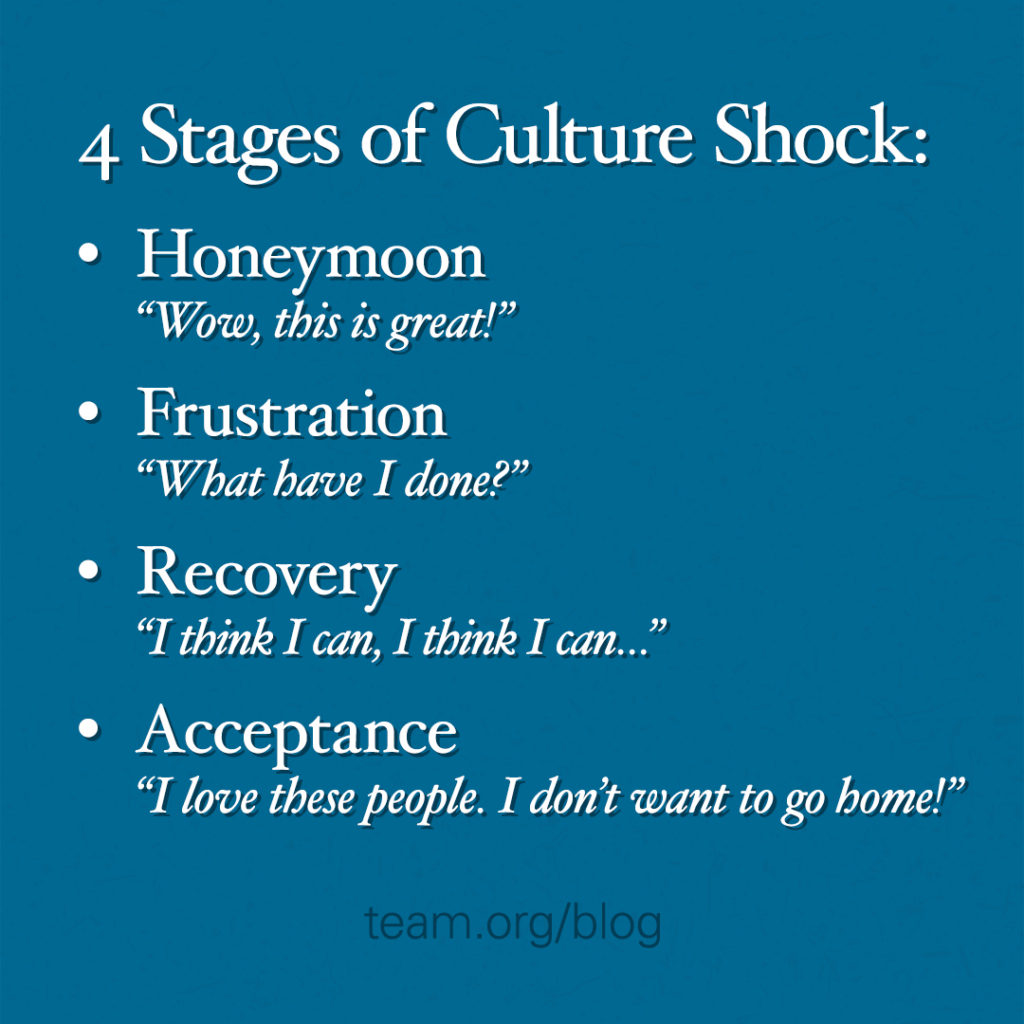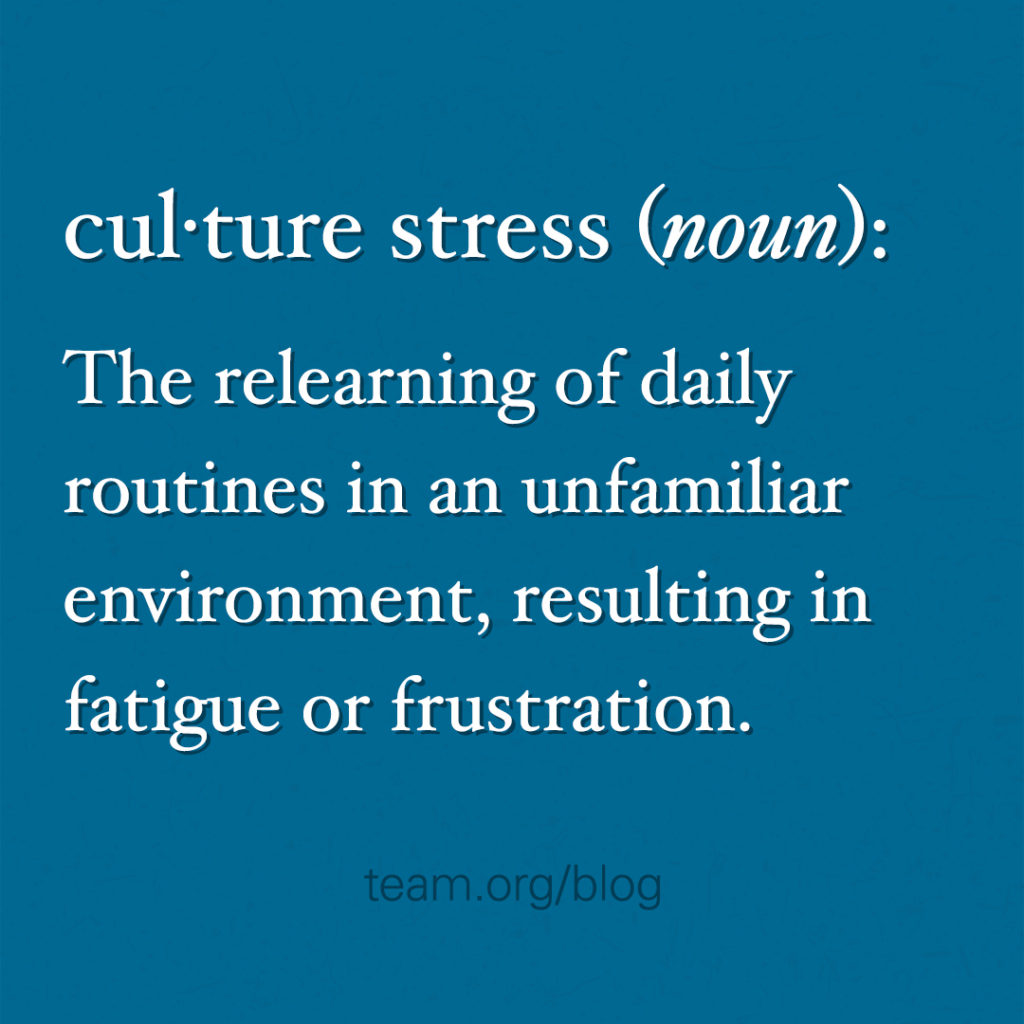
Missionary Life
How to Handle Culture Stress
April 24, 2017
by Debbie Stephens

In the last 18 years, I have traveled to countries on nearly every continent. Every country I traveled to has taught me about culture and about myself.
Through my travels, I have experienced things completely foreign to my definition of normal.
I have bathed and washed my hair in a bucket, slept in a treehouse, eaten with monkeys, been roommates with scorpions, used two boards as a toilet, traveled through the mountains in the back of a pickup truck and eaten foods I can’t pronounce.
All of these experiences, while exciting, triggered culture stress in me, which can affect your mind, body and emotions.
If you travel abroad, you may have similar experiences of culture stress. But you don’t have to face them unprepared. From one traveler to another, here are my best tips for identifying culture stress and handling it well.
Culture Shock vs. Culture Stress
You have likely heard the term “culture shock” before. While connected to culture stress, culture shock is experienced differently.
Culture shock is defined as a sense of cultural disorientation when exposed to or immersed in a different society. It can also manifest itself when cultural expectations are unmet.

Culture shock generally moves through four different phases:
- Honeymoon (“Wow, this is great!”)
- Frustration (“What have I done?”)
- Recovery (“I think I can, I think I can…”)
- Acceptance (“I love these people. I don’t want to go home!”)
I’ve experienced this during my travels when “normal” activities were suddenly not normal to me anymore.
Culture stress is defined as the relearning of daily routines that are now unfamiliar and unknown, resulting in making new decisions constantly.

Culture stress happened to me as the days went on, and my new daily routine started to weigh on me. I was functioning but on a very limited level. I felt anxious and, at times, scared of some of my circumstances. Culture stress can bring on new levels of fatigue and discouragement.
Other signs you are experiencing culture stress are negativity, frustration, depression, homesickness, anger and even physical illness.
How to Handle Culture Stress
It is normal to experience culture stress, but you don’t want to stay there forever. Here are some ways to process your new way of life, attitudes and cultural norms:
Remember, God is with you. The stresses of entering another culture can lead us to overemphasize our circumstances and deemphasize the ministry God has for us there. Staying connected to God through His word helps me know He doesn’t need me but is allowing me to join Him in the work He is doing.
Talk to someone. Tell your supervisor or teammate how you are feeling. Speaking my feelings out loud seems to bring them into perspective. They aren’t quite so ominous anymore. Ask your co-workers to pray with you. Ask the Lord to give you a love for the people you are serving and strength to overcome the struggles you are experiencing.
Focus on similarities. I find people are the same all over the world. We may have different customs, wear different clothes and eat different foods, but we all experience love, joy, fear and loss. During a particularly difficult trip, God allowed me to connect with a woman in spite of our differing cultures. Praying with her in a time of deep sadness, I saw how God comforted her, and it made me thankful that I was there to experience this with her.
Journal your feelings. When experiencing culture stress, journaling my feelings helps me release some of the negative energy I’m feeling. I also always end with praise for the Lord, as I know He is with me in my struggles. “Whoever dwells in the shelter of the Most High will rest in the shadow of the Almighty. I will say of the Lord, ‘He is my refuge and my fortress my God, in whom I trust'” (Psalm 91:1-2).
Take care of yourself. I have introverted tendencies, meaning I gain energy by spending time by myself. When I feel overwhelmed by crowds of people and need a break, I try to take some time to regroup, even if it is just for a few minutes. When you find yourself becoming anxious or fatigued, find a healthy distraction to refresh yourself. However, be careful not to isolate yourself. “Be sober-minded; be watchful. Your adversary the devil prowls around like a roaring lion, seeking someone to devour” (1 Peter 5:8).
Push yourself to make local friends. Get out in your community. Set a goal to meet someone new or learn something about your host culture every day. Find a local friend, a person of peace, to help you learn the language and local customs (Luke 10:5-6). As a mobilizer with Equipped to Go, I often see short-term missionaries give into the temptation to constantly connect with family and friends on social media. They find themselves between two worlds and often find it easier to cling to the world they know over the new one to be discovered. Making local friends can help you feel more connected to your host culture.
The strangeness you feel will slowly become more natural to you as you climb out of the valley of culture stress and your surroundings become your new normal.
I wouldn’t trade my experiences abroad for anything, even though they felt like struggles at the time. I have grown immensely through each one, and they all mark a special time with my Savior that still fuels my faith today. If you find yourself tired and worn out from living in another culture, hang in there, my friend. He is Faithful!
“But thanks be to God, who always leads us in triumphal procession in Christ and through us spreads everywhere the fragrance of the knowledge of him. For we are to God the aroma of Christ among those who are being saved and those who are perishing.”
2 Corinthians 2:14-15

